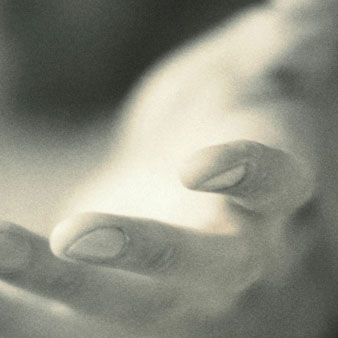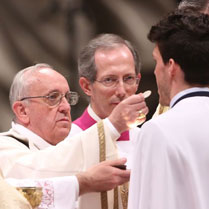Nine days from now, the Church celebrates the feast of St Paul’s conversion. Paul, of course, is the great “Apostle to the Gentiles,” who greatly contributed to the spread of the Christian faith in its embryonic years.
Consequently, the feast recommends itself as an occasion to pray for Christian unity. The disintegration of the Mystical Body on earth is nothing short of scandalous. Every Christian should share our Lord’s desire that Christians might be one.
Some people start a novena for Christian Unity today. This is my own practice. Others wait until tomorrow, and observe an octave of prayer for Christian Unity. So if you read this post a day late, you’ve still got time!
Speaking of time, perhaps you have enough of it to formulate an elaborate pattern of prayer for your novenas and octaves. Perhaps I could make the time myself. I don’t know. I do know that I lack the discipline.
I used to make all sorts of ambitious resolutions which I’d heroically observe for three or four days before collapsing in a heap. Big goals mean big falls, and big falls invite a spiral of discouragement which puts an end to all of it.
I think the enemy figured that out before I did. But once I became alert to it, I confounded the enemy by “thinking small.” A modest task, performed with love, becomes great anyway. So make it easy on yourself. Think small and childlike! For my part, I will recite this prayer by Bl John Henry Newman each day, and I will perform a small act of self-denial.
Why the mortification? I think it’s one of the secrets of the saints. When I’m faced with a problem or challenge, I tend to act to resolve it. The saints, in contrast, in the first place pray for a resolution to the problem or challenge; in the second place, they’d fast and atone; and only in the third place would they act – often, by then, by inspiration of the Holy Spirit!
Anyway, here’s Cardinal Newman’s prayer for Christian Unity:
O Lord Jesus Christ,
when you were about to suffer,
you prayed for your disciples to the end of time,
that they might all be one,
as you are in the Father,
and the Father in you.
Look down in pity on the many divisions
among those who profess your faith
and heal the wounds which the pride of man
and the craft of Satan have inflicted on your people.Break down the walls of separation
which divide one party and denomination
of Christians from another.Look with compassion on the souls
who have been born in one or another
of these various communions
and bring them all into that one communion
which you set up in the beginning:
the One, Holy, Catholic and Apostolic Church.
Perhaps this prayer is not ecumenical in application, insofar as it may arouse objections from Protestants and Orthodox if it was prayed in their company. But certainly the prayer is ecumenical in spirit and intent, and perfectly suitable for private prayer.






Dear Fr John,
Just for your information, the Week of Prayer for Christian Unity, as this novena is now known, is celebrated in the Northern Hemisphere at this time, but in the Southern Hemispher (ie. here in Oz) we do it from the Feast of the Ascension until the Eve of Pentecost.
Just worth a mention.
Ah yes. Thanks David! I neglected to mention that I observe the novena now, in contrast to the octave or Week of Christian Unity we Aussies celebrate later in the year.
Taking issue, Fr John. “Disintegration”?
If Our Lord suffered extreme bruising and bleeding — but no broken bones — surely this is also represents the worst state of the Mystical Body, but it has not disintegrated! Protestant and schismatic organisations are outside the Mystical Body, not part of it, except in the sense they were once, but have been ‘flayed’ away from it.
It is wonderful to see individuals and some small communities of traditional Anglicans return to the Mystical Body, bringing with them beautiful liturgical and prayer forms which we can all now enjoy.
Hi MuMu!
It could be all those years in the seminary, wherein “integration” and “disintegration” were terms related to integrity and unity. In light of your response, I realise now that disintegration has a different nuance in the popular lexicon.
As Wittgenstein observed, words are best defined by their use, not by their etymological history.
In any event, the word as I intended to use it is consonant with the ‘flaying’ you have described.
May I recommend to you, MuMu, some reading that might cause you to modify your understanding of the Mystical Body and your readiness to exile so many other Christians. Pope Pius XII wrote in his encyclical that though non-Catholics were deprived of the gifts only enjoyed in the Catholic Church they were related to the mystical Body by unconscious yearning and desire. Pius’ desire that they should have life in abundance was accompanied by his attribution of the cause of their continued wandering to the failure of the faithful to pray fervently for this intention.
In Lumen Gentium, the Council recognised that those baptised who did not profess the Catholic faith or worship in unity were linked with the Church in many ways and that they were joined “with us in the Holy Spirit”.
The characterisation of the Roman Catholic Church and its juridical associates as the Mystical Body of Christ is a doctrine about which different views may be held and argued, of course. But what is increasingly not in doubt is that there has for some time been an uncomfortable fit between embracing the Catholic faith in love on the one hand and dismissing everyone else as non-U or outsiders, in more than just one sense, on the other.
Protestantism and Orthodoxy are not, in my view, in any meaningful sense, “flayed” from the pilgrim church centred around Christ. They represent the beam-in-the-eye of, and an alternatively ancient and venerable tradition to, respectively, the religious tradition you may have just happened by accident or divine design to have been born into. (If you are a convert, a different dynamic obviously applies).
You clearly decline to admit that the “mystical” body of Christ can disintegrate. I agree. My view is that the mystical body of Christ is a trans-epochal, trans-theological spiritual concept made real by the good acts (by grace or otherwise) of Christians everywhere, and is one. But the visible ordinance we see as churches claiming to be the one true church is very much disintegrated. In my view, the Roman Catholic church just happens to be the largest and most imposing piece of the train-wreck. Jesus’ prayer that “they” be one applies, it seems to me, to everyone who is not.
Of course, I could be wrong, but perhaps you might like to think about it.
Stephen, I am aware of the Church’s view of other Christian communities’ relationship to the Mystical Body. I think of them as having been “flayed” from the Church by the scourgings of heresy. They are related through Baptism.
Please don’t introduce the tired old chestnut of imputing judgmentalism concerning individuals in what I have written, into the discussion. As far as I am aware, the Church does not permit Protestants to receive Holy Communion except in exceptional circumstances. Or don’t you believe what the Church teaches? You prefer your own ideas?
Thank you for your response, MuMu. You have indeed articulated a nuance in your earlier position that appeared to deny non-Catholics any relationship whatsoever with the MB of C. For the sake of accuracy, however, I must reply to a couple of your other comments.
Firstly, I don’t believe I introduced any tired old chestnut about judging individuals in relation to your post. Your initial comment effectively denied non-Catholics any part of the MB of C as an entire class, and all I suggested was that recent expressions of the doctrine did not reflect such a sweeping characterisation.
Secondly, my comments on Communion were contained in my other reply to you. As a general rule-of-thumb, I think each church is free to make its own rules about the reception of sacraments and that, provided justice is observed, such rules should be respected.
I do think it regrettable however that Christians generally have sectarian attitudes and feel uncomfortable and excluded from each other’s religious activities. This is probably inevitable given the way we have, and become familiar with, our respectively different customs and language and we are naturally uncomfortable with the strange. It isn’t always the case that different churches describe other Christians in outrageous sweeping terms, but the effect is certainly that, sub-consciously, for many Christians the other Christians are “not real Christians like us”.
I don’t say that Communion reception should be open slather: on the contrary, it’s a sign of desire to be one with the others and if you don’t desire to be one, then you shouldn’t abuse the sign. But I think there would be Christians in different churches who would have such a desire and whose different takes on doctrinal details are not of such character as to interfere with or contradict such desire, and it seems incongruous and not a little bizarre that such people cannot join fully into a Eucharist while many card-carrying Catholics routinely can. So, no, I don’t agree with a teaching that is quite happy for that result or situation to continue or thinks it isn’t a problem.
Thanks for the enlightenment, Fr John. One of the manifestations of a false ecumenism which I have come across is the notion that anyone can receive the Eucharist and ignore the boundaries separating them from the Church. Nobody says a thing for fear of not being nice and kind. Often these people have outrageously distorted views on — or they are completely ignorant of — Catholic doctrine. They feel no need of being instructed because they know it all. Then there is the terrible risk of sacrilege. Are we to stand by silently and say nothing? It is happening A LOT!
I find myself agreeing with you yet again, MuMu, when you object to the view that anyone can “receive the Eucharist”. What you are referring to, of course, is receiving the host at the Communion in the Mass or its equivalent in other rites of worship. I do acknowledge that because none of us are worthy of taking the sacrament, it should not be denied for the sake of generally repentant failings, hence the Pian encouragement of early and frequent communion. However, the exclusion of sincere, pious Christians from other churches is not a step too far removed from the exclusion of Catholics who through the week engage in all kinds and degrees of uncharity and dishonesty. For this reason, then, perhaps more peolle than you initially envisaged should refrain from reception of the host and have recourse to that wonderful salve for sinners, the “Visits to the Blessed Sacrament” by St Alphonsus Ligouri. “Lord, since I cannot now receive you sacramentally, come at least spiritually into my heart”, went the saying, if I remember correctly. We might in this find ourselves united in a great communion after all, without causing offense to those denominational boundaries you referred to.
Sadly Stephen, I suspect those who make spiritual communions are those who are most worthy to receive Holy Communion and those who are not worthy have probably never heard of a spiritual communion. Of course, Catholics who commit sacrilege are probably far more culpable than non-Catholics who go up and receive… But then, how many Catholics have even a rudimentary notion of the catechism?
I was writing of objective truths, not the state of souls of communicants, because, of course, we can’t judge.
Let us not forget that ‘true Ecumenism’ and ‘Christian Unity’ actually means the uncompromising and complete conversion to the Catholic Faith, wherein lies the fullness of Truth.
Any prayer that Protestants would remain in the error of their ‘ecclesial communities’ is uncharitable, and detrimental to the salvation of their souls.